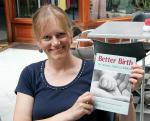Better birth - experience matters
 Childbirth Childbirth
Family influences and upbringing play as much of a role in a couple's decision to have children as either career or financial pressures, according to a University of Adelaide researcher. Lareen Newman has recently completed her PhD thesis on how men and women's experiences of childbirth and child rearing affect Australia's birth rate. Ms Newman, a BA (Geography) Honours graduate, said parents' experiences of child rearing could influence whether their own children chose to have a family. Thirty-nine families were interviewed across Adelaide, including 38 mothers and 24 fathers. The study also revealed that people who came from large families themselves were more likely to have at least two children. "If parents demonstrate they can combine parenting and work without too much conflict, that message seems to be passed on to their children," Ms Newman said. "Conversely, if parents relay a negative attitude about the difficulties of raising children, their offspring can also be turned off parenting." Ms Newman said the people in her study who had experienced divorce and domestic violence as children were more likely to intend to remain childless. Painful birth experiences also have a major impact on a couple's desire to have more children, with 25% of respondents claiming this as a contributory factor in restricting their family size. This may have a major bearing on South Australia's fertility rate, considering it has one of the highest caesarean rates in the world - 30% - double that of the World Health Organisation's recommended level. "A British study in 2004 found that around half of the women who had caesarean or assisted delivery felt they could not face giving birth again," Ms Newman said. "This doesn't augur well for South Australia. Translating the figures from that study means 13% of women here will never have another baby because of that birth experience." Ms Newman's research also revealed inconsistencies in a couple's expectations when it comes to juggling parenting and household responsibilities. "Where both partners have worked before having children and shared household chores, after childbirth these women expect men to also share parenting duties. This isn't happening and it creates a lot of conflict. "In more traditional relationships, however, there is less conflict if each partner's role is established from the start." In conjunction with her PhD research, Ms Newman has also written her first book, Better Birth: The Definitive Guide to Childbirth, released by New Holland Australia last month. The book, co-authored by Heather Hancock, is an information guide for pregnant women and a resource for midwives and other health professionals. It explains the midwifery and obstetric views of birth, how the choice of care provider and birthplace can influence a woman's experience, and how women can make choices which match their preferences. "This book will help to counter the horror stories about giving birth because it relates some really positive experiences of childbirth. A lot of it is about the impacts of the maternity system, not a failure of the woman's body." The book includes a section of 12 birth stories, six by Adelaide women. Better Birth: The Definitive Guide to Childbirth, is available at most bookshops throughout Australia, including all Dymocks and Big W stores. Story by Candy Gibson
|





